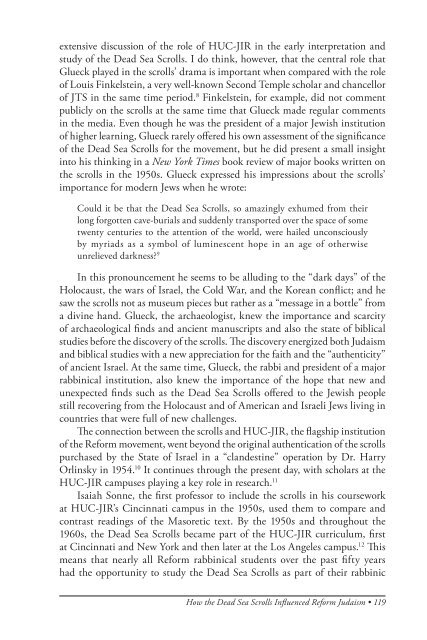The American Jewish Archives Journal, Volume LXI 2009, Number 1
The American Jewish Archives Journal, Volume LXI 2009, Number 1
The American Jewish Archives Journal, Volume LXI 2009, Number 1
Create successful ePaper yourself
Turn your PDF publications into a flip-book with our unique Google optimized e-Paper software.
extensive discussion of the role of HUC-JIR in the early interpretation and<br />
study of the Dead Sea Scrolls. I do think, however, that the central role that<br />
Glueck played in the scrolls’ drama is important when compared with the role<br />
of Louis Finkelstein, a very well-known Second Temple scholar and chancellor<br />
of JTS in the same time period. 8 Finkelstein, for example, did not comment<br />
publicly on the scrolls at the same time that Glueck made regular comments<br />
in the media. Even though he was the president of a major <strong>Jewish</strong> institution<br />
of higher learning, Glueck rarely offered his own assessment of the significance<br />
of the Dead Sea Scrolls for the movement, but he did present a small insight<br />
into his thinking in a New York Times book review of major books written on<br />
the scrolls in the 1950s. Glueck expressed his impressions about the scrolls’<br />
importance for modern Jews when he wrote:<br />
Could it be that the Dead Sea Scrolls, so amazingly exhumed from their<br />
long forgotten cave-burials and suddenly transported over the space of some<br />
twenty centuries to the attention of the world, were hailed unconsciously<br />
by myriads as a symbol of luminescent hope in an age of otherwise<br />
unrelieved darkness? 9<br />
In this pronouncement he seems to be alluding to the “dark days” of the<br />
Holocaust, the wars of Israel, the Cold War, and the Korean conflict; and he<br />
saw the scrolls not as museum pieces but rather as a “message in a bottle” from<br />
a divine hand. Glueck, the archaeologist, knew the importance and scarcity<br />
of archaeological finds and ancient manuscripts and also the state of biblical<br />
studies before the discovery of the scrolls. <strong>The</strong> discovery energized both Judaism<br />
and biblical studies with a new appreciation for the faith and the “authenticity”<br />
of ancient Israel. At the same time, Glueck, the rabbi and president of a major<br />
rabbinical institution, also knew the importance of the hope that new and<br />
unexpected finds such as the Dead Sea Scrolls offered to the <strong>Jewish</strong> people<br />
still recovering from the Holocaust and of <strong>American</strong> and Israeli Jews living in<br />
countries that were full of new challenges.<br />
<strong>The</strong> connection between the scrolls and HUC-JIR, the flagship institution<br />
of the Reform movement, went beyond the original authentication of the scrolls<br />
purchased by the State of Israel in a “clandestine” operation by Dr. Harry<br />
Orlinsky in 1954. 10 It continues through the present day, with scholars at the<br />
HUC-JIR campuses playing a key role in research. 11<br />
Isaiah Sonne, the first professor to include the scrolls in his coursework<br />
at HUC-JIR’s Cincinnati campus in the 1950s, used them to compare and<br />
contrast readings of the Masoretic text. By the 1950s and throughout the<br />
1960s, the Dead Sea Scrolls became part of the HUC-JIR curriculum, first<br />
at Cincinnati and New York and then later at the Los Angeles campus. 12 This<br />
means that nearly all Reform rabbinical students over the past fifty years<br />
had the opportunity to study the Dead Sea Scrolls as part of their rabbinic<br />
How the Dead Sea Scrolls Influenced Reform Judaism • 119

















